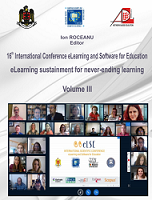DIDACTIC CAPACITY OF “WEBQUEST” TECHNOLOGY IN MODERN FOREIGN LANGUAGE EDUCATION
DIDACTIC CAPACITY OF “WEBQUEST” TECHNOLOGY IN MODERN FOREIGN LANGUAGE EDUCATION
Author(s): Yulia Savinova, Svetlana PozdnyakovaSubject(s): Foreign languages learning, Higher Education , ICT Information and Communications Technologies, Distance learning / e-learning, Pedagogy
Published by: Carol I National Defence University Publishing House
Keywords: educational process; “WebQuest” technology; information and communication competence; e-learning resources; information resources; e-learning;
Summary/Abstract: The paper focuses on didactic capacities and perspectives of “WebQuest” technology elaboration in teaching foreign language communication. The establishment of a new educational system, aimed at interacting at international level requires a high level of knowledge and preparation for any life conditions. It means that the learning of several foreign languages rather than one has become one of the educational background conditions, a factor, which has a significant impact on successful advancement in various spheres of activities in a new post-industrial society. Contemporary conditions to higher education have highlighted the need for blended learning application, which combines a methodical variability. In this regard, the “WebQuest” technology in foreign language teaching has proved to be an effective and motivational tool. Based on the project-based learning, it integrates communicative, problem-based learning and research methods, and possesses a number of advantages. Firstly, the “WebQuest” technology improves building creative and motivational capacity of students and enhances the objectivity of assessment. Secondly, learners enlarge their experience in presentation making, business negotiations and the use professional terminology. Thirdly, learners acquire new knowledge, extend multidisciplinary links due to the related subject areas, use authentic materials in foreign languages, which significantly enhances possibilities of professionally oriented foreign language communication. Thus, the use of the educational “WebQuest” technology in teaching foreign languages at HEIs showcased that its effectiveness in the educational process is of polarized nature. This kind of activity fosters positive motivation, which in its turn results in enhancing foreign language competence of students, desire to raise their personal and professional self-esteem and take competitive advantage in society.
Journal: Conference proceedings of »eLearning and Software for Education« (eLSE)
- Issue Year: 16/2020
- Issue No: 03
- Page Range: 480-484
- Page Count: 5
- Language: English

